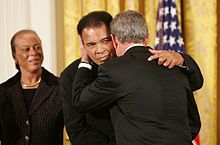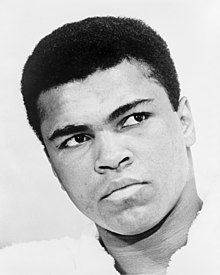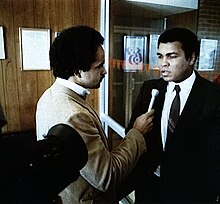Muhammad Ali (born
Cassius Marcellus Clay, Jr.; January 17, 1942) is an American former professional
boxer, generally considered among the greatest heavyweights in the sport's history. A controversial and even polarizing figure during his early career, Ali is today widely regarded not only for the skills he displayed in the ring but for the values he exemplified outside of it: religious freedom, racial justice and the triumph of principle over expedience.
[1][2] He is one of the most recognized sports figures of the past 100 years, crowned
"Sportsman of the Century" by
Sports Illustrated and
"Sports Personality of the Century" by the
BBC.
[3][4]
In 1967, three years after winning the heavyweight title, Ali refused to be conscripted into the
U.S. military, citing his religious beliefs and opposition to the
Vietnam War. He was eventually arrested and found guilty on draft evasion charges and stripped of his boxing title. He did not fight again for nearly four years—losing a time of peak performance in an athlete's career. Ali's appeal worked its way up to the
U.S. Supreme Court, where in 1971 his conviction was overturned.
Nicknamed "The Greatest", Ali was involved in several historic
boxing matches.
[5] Notable among these were the first Liston fight, three with rival
Joe Frazier, and one with
George Foreman, where he regained titles he had been stripped of seven years earlier.
Ali revolutionized the sport of boxing by sheer power and magnetism of his personality. At a time when most fighters let their managers do the talking, Ali thrived in -- and indeed craved -- the spotlight, where he was sometimes provocative, frequently outlandish and almost always entertaining. He controlled most press conferences and interviews, and spoke freely about issues unrelated to boxing. He transformed the role and image of the black athlete in America by his embrace of racial pride and his willingness to antagonize the white establishment in doing so. Ali likely was the first celebrity-athlete in the modern sense of the term; in the words of writer Joyce Carol Oates, he was one of the few athletes in any sport to completely "define the terms of his public reputation."
[6]
at a White House dinner, 1977

As Mrs. Lonnie Ali looks on,

President
Reagan "punching" Muhammad Ali in the oval office, 1983














































































No comments:
Post a Comment